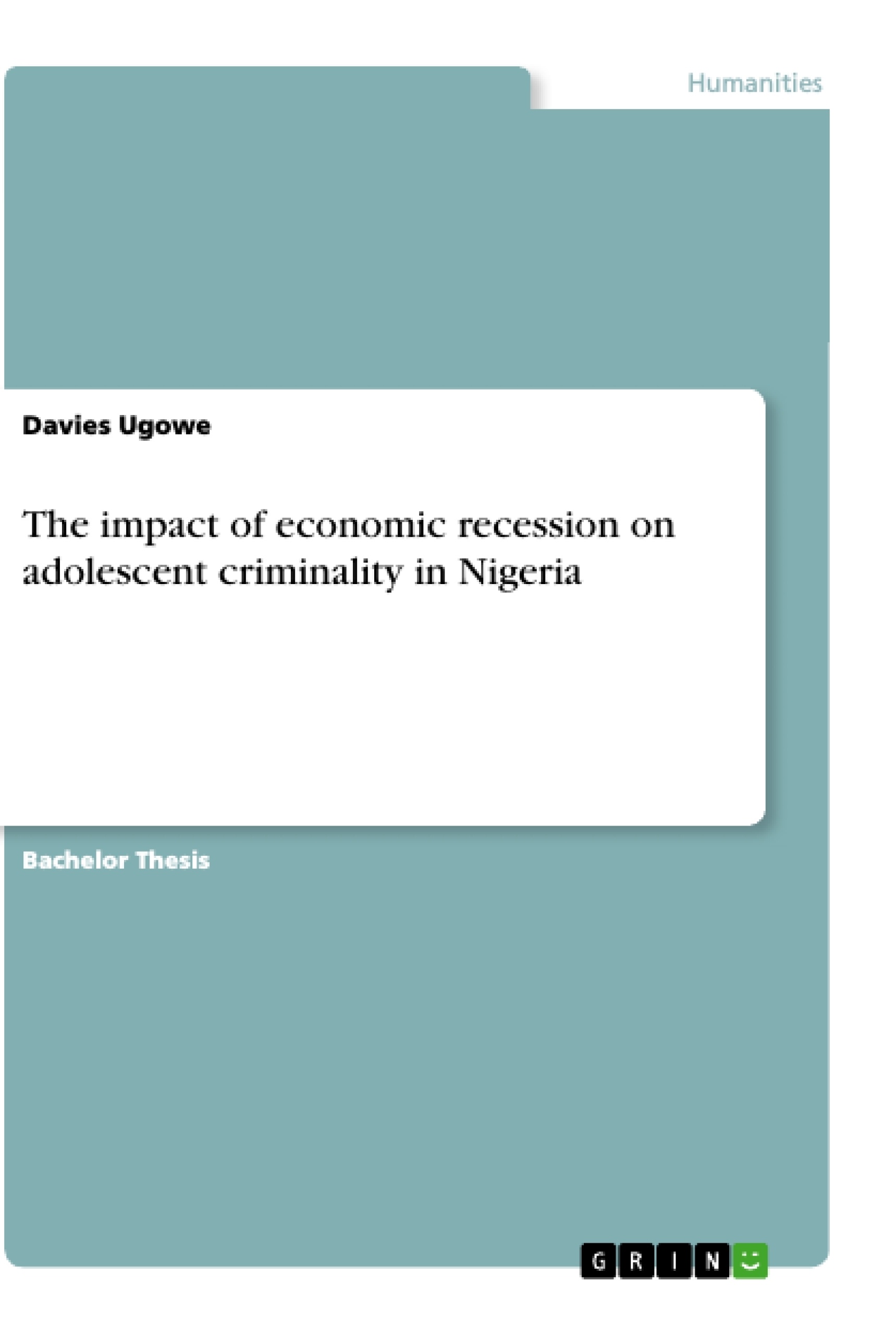The work determines if the economic recession in Nigeria has any influence on criminal behaviour amongst youths. The specific objectives of this research are to identify the causes of recession, to determine the social implications of economic recession on the society, to ascertain the increase in the level of crime amongst youths in economic recession and to ascertain the patterns of crime committed by youths in periods of economic downturn.
The author examines the influence the downturn of the economic had on the criminal behaviour among youths, most especially those based in Benin City, Edo State Nigeria. Therefore, data from pre-economic recession to post-economic period recession has been analysed. A combination of a longitudinal and cross sectional study survey was used in order to gather the needed data from subjects, newspapers and crime statistics.
The author discovered that the fall in the price of crude oil and poor economic policy were the major causes of economic recession in the period. During this period there were closure of businesses resulting from low patronage and high cost of doing business in the country. There was a high rate of unemployment which resulted tin social instability and youth restiveness in the state.
Inhaltsverzeichnis (Table of Contents)
- ABSTRACT
- CHAPTER ONE
- INTRODUCTION
- STATEMENT OF PROBLEM
- OBJECTIVE OF THE STUDY
- SCOPE OF STUDY
- OPERATIONAL DEFINITION OF TERMS
- CHAPTER TWO
- LITERATURE REVIEW
- INTRODUCTION
- MEANING AND NATURE OF RECESSION
- ECONOMIC RECESSION: HISTORICAL PERSPECTIVE
- REASONS WHY RECESSIONS OCCUR
- CAUSES OF RECESSION IN NIGERIA
- IMPLICATIONS OF ECONOMIC RECESSION ON THE SOCIETY
- YOUTHS AND CRIMES
- UNPACKING THE CATEGORY 'YOUTH'
- Impacts of Crisis on Young People's Access to Decent Employment
- How Young People Cope with Employment Shocks
- Causes of increasing youth crime
- PATTERNS OF CRIMES BY YOUTH DURING ECONOMIC CRISIS
- Theoretical framework
- RESEARCH QUESTION
- CHAPTER THREE
- METHODOLOGY
- INTRODUCTION
- RESEARCH DESIGN
- STUDY AREA
- Population of the study
- SAMPLE SIZE AND SAMPLING PROCEDURE
- SOURCES OF DATA COLLECTION
- METHODS OF DATA COLLECTION
- METHOD OF DATA ANALYSIS
- CHAPTER FOUR
- PRESENTATION AND DISCUSSION OF FINDINGS FROM THE STUDY
- CAUSES OF ECONOMIC RECESSION
- SOCIAL-IMPLICATIONS OF ECONOMIC RECESSION
- PATTERNS OF CRIME DURING RECESSION
- INCREASE IN THE LEVEL OF CRIME
- CHAPTER FIVE
- SUMMARY, CONCLUSION, FINDINGS, DISCUSSIONS AND RECOMMENDATIONS
- SUMMARY
- DISCUSSION OF FIINDINGS
- CONCLUSION
- RECOMMENDATIONS
- REFERENCE
- APPENDIX
Zielsetzung und Themenschwerpunkte (Objectives and Key Themes)
This study aims to investigate the relationship between economic recession and criminal behaviour among youths in Benin City, Edo State, Nigeria. It examines the impact of the economic downturn on the prevalence of crime, particularly kidnapping, murder, and attempted murder, during the period of recession. The study uses both longitudinal and cross-sectional data from various sources, including newspaper reports, crime statistics, and surveys.
- The influence of economic recession on criminal behavior among youths in Benin City, Edo State, Nigeria.
- The specific types of crimes that increased during the economic recession.
- The social and economic factors contributing to the rise in crime during the recession.
- The impact of unemployment and economic hardship on youth criminal activity.
- The effectiveness of policies and interventions aimed at addressing youth crime and social unrest.
Zusammenfassung der Kapitel (Chapter Summaries)
The first chapter of this study provides a comprehensive overview of the research problem, objectives, scope, and definitions of key terms. It emphasizes the impact of the 2016 recession on various sectors of the Nigerian economy, particularly job losses in the manufacturing, service, and retail sectors. The chapter highlights the impact of the economic downturn on formal and informal sectors, including the rising cost of goods and services, and its consequences for individuals and families, especially during the Yuletide period.
Chapter Two explores the existing literature on economic recession and its relationship to crime, particularly youth crime. It examines the meaning and nature of recession, its historical context, and various causes, including factors related to the Nigerian economy. The chapter further delves into the implications of economic recession on society and the specific challenges faced by young people, such as unemployment, economic hardship, and their coping mechanisms.
Chapter Three presents the methodology employed in this study, including the research design, study area, population, sample size, sampling procedure, data collection methods, and data analysis techniques. This chapter elaborates on the combination of longitudinal and cross-sectional study surveys used to gather data, and the use of newspaper articles and crime statistics as secondary data sources.
Schlüsselwörter (Keywords)
This study focuses on the impact of economic recession on criminal behavior among youths in Benin City, Nigeria. The key concepts explored include economic recession, youth crime, unemployment, poverty, social instability, kidnapping, murder, attempted murder, and the relationship between economic factors and criminal activity. The study draws upon various sources to analyze the trends and patterns of crime during the recession period.
- Quote paper
- Davies Ugowe (Author), 2017, The impact of economic recession on adolescent criminality in Nigeria, Munich, GRIN Verlag, https://www.grin.com/document/511296




